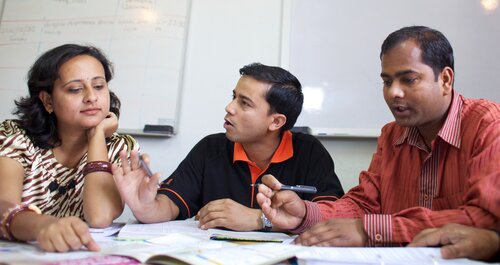UHC2030 hosted its annual UHC Day parliamentarian town hall to...
14th June 2021 13:00 UTC
Tools to help civil society actors understand public financing for health in the context of UHC

Understanding public financing for health is critical to effective advocacy to advance efforts to implement universal health coverage (UHC). A new toolkit developed by UHC2030 and PMNCH aims to give civil society and other stakeholders a better understanding of the issues as well as building their health budget literacy.
Health budget literacy is critical for civil society (and other stakeholders such as media and parliaments) in order for them to be in a position to influence decision-making on the allocation and use of public resources for health.
The way public funds are allocated and spent has a direct impact on the level of service coverage, financial protection, and equity, all of which are crucial for UHC.
Investment in health is a political choice, underpinned by the social contract between citizens and the state. Civil society has an enormous potential to hold governments and donors accountable for the level and use of resources allocated to health. At both the national and local levels, civil society organisations rooted in local communities, working together in strategic alliances, can play an important role in ensuring transparency and accountability in the way government spends funds on health services.
It has become more critical than ever that organisations should get involved in the planning process and influence national spending priorities. Covid-19 disproportionately affects vulnerable populations, including marginalised women, children and adolescents, the poor, the disabled, those living in humanitarian and fragile settings, and ethnic minorities among others. Its effects are felt in particular by women who are shouldering a disproportionate amount of indirect health and other social and economic impacts by virtue of their gender.
Health budget literacy includes accessing budget information, analysing it to expose the decisions made and their implications, and influencing budget choices through advocacy and accountability.
Approaches to health budget advocacy and accountability need strengthening in order to promote better multi-stakeholder collaboration and coherence across the sector for UHC. For this reason, UHC2030 and PMNCH have developed the Health Budget Toolkit, which provides a set of tools and materials that stakeholders can select and apply according to the country context.
The resource aims to:
- show a clear link between public budget analysis and accountability in UHC evidence-based advocacy;
- provide key terms, approaches and strategies that are used in budget analysis for UHC, in order to plan advocacy and accountability;
- emphasize the importance of multisectoral collaboration by bringing advocacy and accountability perspectives to the media, parliamentarians and civil society; and
- provide tools for health budget analysis which all users can apply to learn and develop the skills to advance UHC goals and principles through advocacy and accountability.
How can the toolkit be used?
The toolkit is directed at facilitators or trainers or health activists who have experience in budget analysis for advocacy and accountability in health and who will use this toolkit to build capacity of CSOs, the media, parliamentarians and staff in their own organizations.
The approach aims to convene partners with expertise and experience in this area to draw on good practice, learn from challenges and develop a collective approach to strengthening health budget advocacy and accountability in the context of the Sustainable Development Goals.
How can such a toolkit make a difference?
The toolkit has already been put into practice. For example, the Global Fund to Fight AIDS, Tuberculosis and Malaria, the Global Financing Facility (GFF), Gavi - the Vaccine Alliance, UHC2030, and PMNCH together with their local CSO constituencies, are collaborating to provide training and support on budget advocacy and accountability in favour of health financing and UHC. The design of this joint agenda is a result of previous collaborations in the area of budget advocacy and builds upon existing collaboration initiatives such as the SDG3 Global Action Plan’s Sustainable Financing Accelerator and the Civil Society Accelerator.
To date, training has been provided in English and French through civil society partners in 20 countries[1] including technical support to develop country advocacy and accountability action plans and their implementation. Collaboration has proven instrumental in not just increasing knowledge and understanding of health financing issues as well as access to relevant information, but also to promote alignment of training programmes with country programmes and reforms, through discussions with partners on the ground and by connecting civil society organisations with relevant decision-makers in the ministry of health and Parliament.
Find the toolkit here
UHC2030 and PMNCH collaboration to promote social participation and accountability
This budget toolkit has been developed as part of UHC2030 and PMNCH’s broader efforts to ensure UHC delivers better health outcomes for women, children and adolescents through social participation and accountability. This means putting vulnerable groups at the center of efforts to ensure equitable access to services and building trust and accountability by widening participation in health governance and decision making. This approach involves:
- using a joint political engagement strategy to influence the UHC/PHC and WCAH agendas through relevant political processes, which includes a strong focus on institutionalizing participatory governance in health to drive progress with the implementation of the WHO handbook on social participation for UHC;
- strengthening partner capacity in driving accountability and advocacy by equipping them to better participate in health decision making processes and influence resource allocation and expenditure with tools such as the budget toolkit.
[1] Benin, Burkina Faso, Cameroon, Chad, Côte d’Ivoire, Democratic Republic of Congo, Ethiopia, Ghana, Kenya, Liberia, Madagascar, Malawi, Mozambique, Niger, Nigeria, Senegal, Sierra Leone, Tanzania, Togo and Uganda.

More UHC2030 News
A global health financing emergency threatens progress toward...
UHC2030 at HSR2024: Advancing equity and inclusion in health systems through civil society knowledge
UHC2030, in collaboration with the SUPPORT-SYSTEMS research...
